|
|
 |
Fiche d'espèce de Copépode |
|
|
Cyclopoida ( Ordre ) |
|
|
|
Oithonidae ( Famille ) |
|
|
|
Oithona ( Genre ) |
|
|
| |
Oithona atlantica Farran, 1908 (F,M) | |
| | | | | | | Syn.: | Oithona spinirostris : Sars, 1913 (1918) (p.6, figs.F,M), no Claus, 1863; Campbell, 1929 (p.322, Rem.); Peterson & Miller, 1977 (p.717, Table 1, seasonal occurrence); Dawson & Knatz, 1980 (p.9, figs.F,M); ? Kasturirangan, 1963 (p.75, 77, fig.F); Falkenhaug & al., 1997 (p.449, spatio-temporal pattern);
O. plumifera var. atlantica Früchtl, 1923 a (p.141, figs.F, Rem.); Dussart, 1984 (p.25, 64: occurrence):
O. plumifera : Mori, 1929 (p.200, figs.F); 1937 (1964) (p.109, figs.F,M) | | | | Ref.: | | | Farran, 1908 a (p.500, 502, Rem.); Rosendorn, 1917 a (p.12, figs.F); Farran, 1920 (p.17, 24); 1926 (p.294, Rem.); Kiefer, 1929 g (p.5, Rem.F); Dakin & Colefax, 1933 (p.207); Jespersen, 1934 (p.124, fig.33); 1940 (p.87, fig.8); Farran, 1936 a (p.407, Rem.); Marques, 1966 (p.11); Vinogradov, 1968 (1970) (p.61, 63); Vilela, 1968 (p.30); Ramirez, 1969 (p.85, figs.F: as plumifera, Rem.); Wellershaus, 1970 (p.483, 484); Shih & al., 1971 (p.55); Kos, 1972 (Vol. I, figs.F, Rem.); Bradford, 1972 (p.48, figs.F); Shuvalov, 1972 (1975) (p.180, figs.F, Rem., non small forms); Nishida & al., 1977 (p.126, figs.F, Rem.); Shuvalov, 1980 (p.96, figs.F, Rem.M); Björnberg & al., 1981 (p.663, figs.F); Nishida, 1985 a (p.17, Redescr.F, figs.F, Rem. p.71, 124); 1986 (p.386); Prado Por, 1986 (p.517); Kim & al., 1993 (p.271); Mazzocchi & al., 1995 (p.215, figs.F, Rem.); Chihara & Murano, 1997 (p.936, Pl.195,200: F,M); Bradford-Grieve & al., 1999 (p.886, 966, figs.F); Avancini & al., 2006 (p.122, Pl. 90, fig.F, Rem.); Vives & Shmeleva, 2010 (p.50, figs.F, Rem.: M); Cornils & Heckmann, 2015 (p.243, Table 1, Fig. 2, molecular biology) | 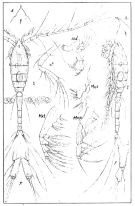 issued from : G.O. Sars in An Account of the Crustacea of Norway. Vol. VI. Copepoda Cyclopoida. Published by the Bergen Museum, 1913 (1918). [Pl.I]. As Oithona spinirostris. Female. R = rostrum; M = Md; m = Mx1; mp1 = Mx2; mp2 = Mxp; F = furca (caudal ramui)
|
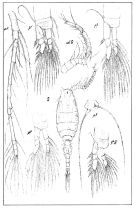 issued from : G.O. Sars in An Account of the Crustacea of Norway. Vol. VI. Copepoda Cyclopoida. Published by the Bergen Museum, 1913 (1918). [Pl.II]. As Oithona spinirostris. Female & Male.
|
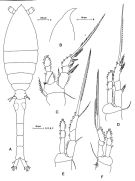 Issued from: M.G. Mazzocchi, G. Zagami, A. Ianora, L. Guglielmo & J. Hure in Atlas of Marine Zooplankton Straits of Magellan. Copepods. L. Guglielmo & A. Ianora (Eds.), 1995. [p.216, Fig.3.39.1]. Female: A, habitus (dorsal); B, forehead (lateral rihht side); C, P1; D, P2; E, P3; F, P4. Nota: Prosome 1.1 times the urosome. Proportional lengths of urosomites and furca 11:32:15:14:17:11 = 100.
|
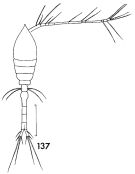 issued from : F.C. Ramirez in Contr. Inst. Biol. mar., Buenos Aires, 1969, 98. [p.86, Lam. XVII, fig.137]. As Oithona plumiferaFemale (from off Mar del Plata): 137, habitus (dorsal).
Scale bar in mm: 2.
Nota: Endopodite of Md with 3 setae. endopodite of Mx2 with 1 long seta (about 3 times length of endopodite). lacking of external plumose seta on 2nd basipodal segments of legs.
|
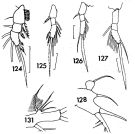 issued from : F.C. Ramirez in Contr. Inst. Biol. mar., Buenos Aires, 1969, 98. [p.80, Lam. XVI, figs.124, 125, 126, 127, 128, 131]. As Oithona plumifera. Female (from off Mar del Plata): 124, P1; 125, P2; 126, P3; 127, P4; 128, endopodite of Mx1; 131, endopodite of Md. Scale bars in mm: 0.05 (124, 125); 0.1 (126, 127)
|
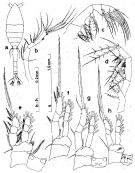 Issued from : S. Nishida in Bull. Ocean Res. Inst., Univ. Tokyo, 1985, No 20. [p.18, Fig.3]. Female: a, habitus (dorsal); b, A2; c, Mx2; d, Mxp; e, P1; f, P2; g, P3; h, P4. Nota after C.R.: Setal formula on outer margin (in first) and inner margin (in second) of exopod segments (from proximal to distal) of P1 to P4: P1: 1, 1, 2; 1, 1, 4. P2: 1, 0, 2; 0, 1, 5 P3: 1, 0, 1; 0, 1, 5. P4: 0, 0, 1; 0, 1, 5.
|
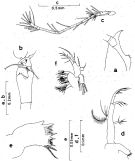 Issued from : S. Nishida in Bull. Ocean Res. Inst., Univ. Tokyo, 1985, No 20. [p.20, Fig.4]. Female: a, forehead (lateral); b, last thoracic segment and genital segment (lateral right side); c, A1; d, Md; e, Md (biting edge); f, Mx1.
|
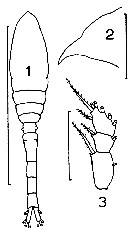 issued from : J.M. Bradford in Mem. N. Z. Oceonogr. Inst., 1972, 54. [p.51, Fig.14, (1-3]. Female (from Kaikoura, New Zealand): 1, habitus (dorsal); 2, forehead (lateral); 3, exopod of P1. Scale bars: 1 mm (1); 0.1 mm (2, 3). Nota: The shape of the rostrum and the hairless genital segment distinguish this species.
|
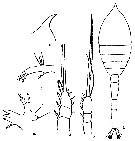 issued from : I. Rosendorn in Wiss. Ergebn. dt. Tiefsee-Exped. \"Valdiviella\", 1917, 23. [p.12, Fig.2]. Female: a, forehead (lateral); b, Md (mandibular palp); c, Mx1; d, exopod of P1; e, exopod of P4; f, habitus (dorsal). Nota: Rostrum straight in dorsal view. Proportion of lengths (p.cent) Prosome : 54.7, Urosome : 45.3 . Relative lengths of urosomal segments and caudal rami: 8 : 20 : 10 : 9 : 11 : 7. Setal formula of the exopod swimming legs P1 to P4 (Se = outer setae ; Si = inner setae), P1 : 1, 1, 2 Se ; 0, 1, 4 Si ; P2 : 1, 0, 2 Se ; 0, 1, 5 Si ; P3 : 1, 0, 1 Se ; 0, 1, 5 Si ; P4 : 0, 0, 1 Se ; 0, 1, 5 Si . Genital segment without tuft of hairs.
|
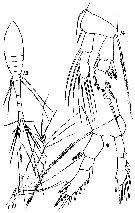 issued from : T. Mori in Zool. Mag. Tokyo, 1929, 41 (486-487). [Pl. VII, Figs.13-16]. As Oithona plumifera. Female (from Chosen Strait, Korea-Japan): 13, habitus (dorsal); 14, P1; 15, A1; 16, P2.
|
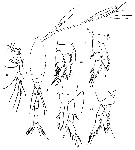 issued from : T. Mori in The Pelagic copepoda from the neighbouring waters of Japan, 1937 (1964). [Pl. 60, Figs.3-8]. As Oithona plumifera. Female: 3, habitus (dorsal); 4, P1; 5, P2; 6, Md; 7, P3; 8, P4.
|
 issued from : T. Mori in The Pelagic copepoda from the neighbouring waters of Japan, 1937 (1964). [Pl. 60, Figs.9-15]. As Oithona plumiferaMale: 9, habitus (dorsal); 10, urosome (dorsal); 11, P1; 12, P2; 13, P3; 14, P4; 15, forehead abd right A1.
|
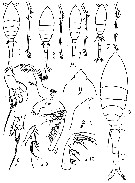 issued from : V.S. Shuvalov in Opred. Faune SSSR, Nauka, Leningrad, 1980, 125. [p.97, Fig.15]. Female: 1-4, habitus and A1 (different specimens); 5, P1; 6, P2; 7, Md; 8, Mxp; 9, A2; 10, Mx2; 11-12, forehead (dorsal and lateral, respectively); 13, prosome (dorsal); 14, urosome (dorsal). Nota: For Shuvalov (1980) the male needs a new description.
|
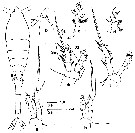 Issued from : S. Nishida, O. Tanaka & M. Omori in Bull. Plankton Soc. Japan, 1977, 24 (2). [p.127, Fig.2]. Female (from Suruga Bay and adjacent waters): a, habitus (dorsal), b, forehead (lateral); c, Md; d, Mx1; e, P1; f, P2; g, P3; h, P4. Se = outer marginal seta; Si = inner marginal seta; St = terminal spine. Nota: Setae formula of exopod P1 to P4 (outer setae in first, inner setae in second). P1: 1,1,2; 1,1,4. P2: 1,0,2; 0,1,5. P3: 1,0,1; 0,1,5. P4: 0,0,1; 0,1,5. Outer seta of exopodite 3 not so sharply bent as Oithona plumifera. Prosome length/urosome length = 1.17-1.32.
|
 Morphological characters of Oithona atlantica female :
1 - Anterior part of prosome produced into pointed rostrum in dorsal view.
2 - Exopod 3rd segment of P1 with 2 outer marginal spines. 3 - Number of setae in exopod of Md more than 3, and prosome length than 3.0 times of prosome width. 4 - Outer marginal spine in exopod 3rd segment of P4 curved straight near base. 5 - Length of marginal spine in exopod 3rd segment of P2 more than 0.8 times of that of terminal spine
|
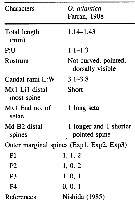 Issued from : A. Cornils & B. Wend-Heckmann in Helgol. Mar. Res., 2015, 69. [p.246, Table 1]. Oithona atlantica charcteristics in the semi-enclosed bight in the northern Germann Wadden Sea (North Sea) Compare with O. nana, O. plumifera, O. similis and O. davisae in the North Sea.
|
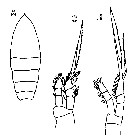 Issued from : K.-I. Yoo & D.-H. Lim in The Korean J. Syst. Zool., 1993, 9 (2) [p.99, Fig.2, A, C, H] Female (from Korean Waters): A, prosome (dorsal); C, P1; H, P4 (Note the form and length of outer margin spine on the 3rd exopodal segment).
| | | | | Ref. compl.: | | | Jespersen, 1939 (p.78, Rem.); Grice & Hart, 1962 (p.287, table 4: abundance); V.N. Greze, 1963 a (tabl.2); Grice, 1963 a (p.496); De Decker & Mombeck, 1964 (p.13); Pavlova, 1966 (p.44); Delalo, 1968 (p.138); Björnberg, 1973 (p.359, 388); Star & Mullin, 1981 (p.1322, abundance); Turner & Dagg, 1983 (p.19, fig.9, 15); Tremblay & Anderson, 1984 (p.7: Rem.); Greze & al., 1985 (p.8); Mikhailovsky, 1986 (p.83, Table 1, ecological modelling); Kosobokova, 1989 (p.27); Anderson J.T., 1990 (p.127, Rem.: p.131); Hirakawa & al., 1990 (tab.3); Yoo, 1991 (tab.1); Hirakawa, 1991 (p.376: fig.2); Santos & Ramirez, 1991 (p.79, 80, 82, 83); Hwang & Choi, 1993 (tab.3); Yoo & Lim, 1993 (p.91, Rem.: p.93, Table 1); Kimmerer, 1993 (tab.2); Richter, 1994 (tab.4.1a); Vinogradov & al., 1994 (tab.1); Kosobokova & al., 1995 (p.194); Santos & Ramirez, 1995 (p.133, Tabl. I); Oliveira Dias, 1995 (p.147); Ragosta & al., 1995 (Appendix A); Hajderi, 1995 (p.542); Hure & Krsinic, 1998 (p.75, 103); Kosobokova & al., 1998 (tab.2); Suarez-Morales & Gasca, 1998 a (p.111); Dolganova & al., 1999 (p.13, tab.1); Goldblatt & al., 1999 (p.2619, Fig.5); Razouls & al., 2000 (p.343, Appendix); Ueda & al., 2000 (tab.1); Kosobokova & Hirche, 2000 (p.2029, tab.2); Musaeva & Gagarin, 2000 (p.534, tab.1); Musaeva & Suntsov, 2001 (p.511); Ringuette & al., 2002 (p.5081, Table 1); Auel & Hagen, 2002 (p.1013, tab.2); Sameoto & al., 2002 (p.13); Hsieh & al., 2004 (p.397, tab.1); Marrari & al., 2004 (p.667, tab.1); Kang & al., 2004 (p.1524); Lo & al., 2004 (p.89, tab.1); Mackas & al., 2004 (p.875, Table 2); Dmoch & Walczowski, 2005 (p.102 + poster); Mazzocchi & al., 2005 (p.155); Choi & al., 2005 (p.710: Tab.III); Berasategui & al., 2005 (p.485, tab.1); Mackas & al., 2005 (p.1011, tab.2, 3); Manning & Bucklin, 2005 (p.233, Table 1); Berasategui & al., 2006 (p.485, fig.2): Ware & McQueen, 2006 (p.28, Table B1, weight ranges); Willis & al., 2006 (p.39, Table 2, advection vs changes in community structure); Hop & al., 2006 (p.182, Table 4, 5: inter-annual variability, fig.15); Blachowiak-Samolyk & al., 2006 (p.101, tab.1); Durbin & Casas, 2006 (p.2537, Table 2a, 2b); Blachowiak-Samolyk & al., 2007 (p.2716, Table 2); Blachowiak-Samolyk & al., 2008 (p.2210, Table 3, 5, biomass, composition vs climatic regimes); Neumann-Leitao & al., 2008 (p.799: Tab.II, fig.6); Muelbert & al., 2008 (p.1662, Table 1, 3); Ohtsuka & al., 2008 (p.115, Table 5); Ayon & al., 2008 (p.238, Table 4: Peruvian samples); Galbraith, 2009 (pers. comm.); Chiba & al., 2009 (p.1846, Table 1, occurrence vs temperature change); Dvoretsky & Dvoretsky, 2009 a (p.11, Table 2, abundance); DFO, 2009 (p.1, fig. 13, seasonal variability); Brugnano & al., 2010 (p.312, Table 2, 3, fig.8); Mazzocchi & Di Capua, 2010 (p.428); Medellin-Mora & Navas S., 2010 (p.265, Tab. 2); Dvoretsky & Dvoretsky, 2010 (p.991, Table 2); 2011 a (p.1231, Table 2; abundance, biomass); 2011 b (p.469, Table A, abundance, biomass); Kosobokova & al., 2011 (p.29, Table 2, 3, fig.4, Rem.: Arctic Basins); Hirche & Kosobokova, 2011 (p.2359, Table 3, abundance, biomass %); Pomerleau & al., 2011 (p.1779, Table III); Turner & al., 2011 (p.1066, Table II, abundance 1998-2008); Hsiao S.H. & al., 2011 (p.475, Appendix I); Mazzocchi & al., 2011 (p.1163, fig.6, long-term time-series 1984-2006); Pepin & al., 2011 (p.273, Table 2, seasonal abundance); Cepeda & al., 2012 (p.1, figs.1, 3, Table 1, Molecular systematic); Uysal & Shmeleva, 2012 (p.909, Table I); DiBacco & al., 2012 (p.483, Table S1, ballast water transport); Miloslavic & al., 2012 (p.165, Table 2, transect distribution); Johnson C & al., 2012 (p.1, 15, fig. 23a, 23b, seasonal variability); Dvoretsky & Dvoretsky, 2012 (p.1321, Table 2, 3, 4, 5, abundance, biomass, production); Sabatini & al., 2012 (p. 33, Table 3, abundance vs stations transect); Mazzocchi & al., 2012 (p.135, annual abundance 1984-2006); Lidvanov & al., 2013 (p.290, Table 2, % composition); Kouwenberg & al., 2014 (p.290, biogeography, Map 9); Pansera & al., 2014 (p.221, Table 2, abundance); Mazzocchi & al., 2014 (p.64, Table 3: occurrence); Fierro Gonzalvez, 2014 (p.1, Tab. 3, 5, occurrence, abundance); Antacli & al., 2014 (p.17, occurrence vs community structure); Benedetti & al., 2016 (p.159, Table I, fig.1, functional characters); Jerez-Guerrero & al., 2017 (p.1046, Table 1: temporal occurrence) ; Ohtsuka & Nishida, 2017 (p.565, Table 22.1); Benedetti & al., 2018 (p.1, Fig.2: ecological functional group) ; Acha & al., 2020 (p.1, Table 3: occurrence % vs ecoregions, Table 5: indicator ecoregions); Hirai & al., 2020 (p.1, Fig. 5: cluster analysis (OTU), spatial distribution). | | | | NZ: | 22 | | |
|
Carte de distribution de Oithona atlantica par zones géographiques
|
| | | | | | | | | | | | | | | | | |  Issued from : S. Nishida in Bull. Ocean Res. Inst., Univ. Tokyo, 1985, No 20. [p.124, Fig.70]. Issued from : S. Nishida in Bull. Ocean Res. Inst., Univ. Tokyo, 1985, No 20. [p.124, Fig.70].
Indo-Pacific geographical distribution of Oithona atlantica. Arrows indicate the stations where the forms intermediate between O. atlantica and O. longispina |
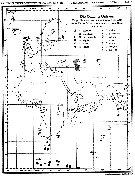 issued from : I. Rosendorn in Wiss. Ergebn. dt. Tiefsee-Exped. "Valdiviella", 1917, 23. [Taf. I]. issued from : I. Rosendorn in Wiss. Ergebn. dt. Tiefsee-Exped. "Valdiviella", 1917, 23. [Taf. I].
The genus Oithona: Distribution of species sampled during the Deutsche Tiefsee Expedition 1898-99.
The size of symbols indicates the relative quantitty of the species. |
 issued from : J.T. Turner & M.J. Dagg in Biol. Oceanogr., 1983, 3 (1). [p.12, Fig.5]. issued from : J.T. Turner & M.J. Dagg in Biol. Oceanogr., 1983, 3 (1). [p.12, Fig.5].
Vertical and inshore-offshore distributions of Oithona atlantica in relation to the 15°C isotherm at pump stations on the Long Island (NW Atlantic) transect (40°31.8'-39°53.2' N, 72°23.6'-72°59.4' W); October 1978.
Station numbers are given on the top axis, and dark horizontal bars identify stations sampled at night. |
 issued from : J.T. Turner & M.J. Dagg in Biol. Oceanogr., 1983, 3 (1). [p.7, Fig.2]. issued from : J.T. Turner & M.J. Dagg in Biol. Oceanogr., 1983, 3 (1). [p.7, Fig.2].
Vertical temperature structure during the Long Island (NW Atlantic) transect (40°31.8'-39°53.2' N, 72°23.6'-72°59.4' W; October 1978). |
 issued from : J.T. Turner & M.J. Dagg in Biol. Oceanogr., 1983, 3 (1). [p.24, Fig.11]. issued from : J.T. Turner & M.J. Dagg in Biol. Oceanogr., 1983, 3 (1). [p.24, Fig.11].
Vertical distribution of Oithona atlantica in relation to positions of the 15°C and 10°C water at the time of sampling during the Long Island time series (40°26'N, 72°18'W; October 1978).
Sampling times are given on the bottom axis, and dark horizontal bars identify periods of darkness. |
| | | | Loc: | | | Antarct. (SW & SE Atlant., Indian), sub-Antarct. (SW Atlant., Indian, SW & SE Pacif.), South Africa (E), Patagonian Shelf, Peninsula Valdés, Mar del Plata, Uruguay (continental shelf), Brazil, off Amazon, Carïbbean Sea, Congo, Cuba, Venezuela, Caribbean Colombia (Tayrona), Morocco-Mauritania, Lisbon, Bay of Bicay, New York, Georges Bank, Massachusetts Bay, Halifax, off Nova Scotia E, Newfoundland, Cape Flemish, Labrador, S Davis Strait, Iceland, Greenland Sea, Fram Strait, Kongsfjorden, Spitsbergen, Norway Sea, Malangen fjord, Barents Sea, Franz Josef Land, White Sea, Kara Sea, Pechora Sea, W Ireland, North Sea, Medit. (Alboran Sea, W Basin, Ligurian Sea, G. of Napoli, Tyrrhenian Sea, Lake Faro (Sicily), Adriatic Sea, Ionian Sea, Aegean Sea, Lebanon Basin, Marmara Sea), Red Sea, Indian, China Seas (Yellow Sea, East China Sea), Taiwan (W, N: Mienhua Canyon, Kuroshio Current), Korea (S & E), Japan Sea, Japan, Honshu (Yoyama Bay), Bering Sea, Arct. (Nansen Basin, Amundsen Basin, Makarov Basin, Barents Sea, Laptev Sea, Lomonosov Ridge, Canadian abyssal plain), off N Hawaii, Pacif. tropical, Pacif. (N Central Gyre), Australia (New South Wales), Tasman Sea, New Zealand (Kaikoura), British Columbia, Hecate Strait, Oregon (off Newport), California, Tomales Bay, Bahia Cupica (Colombia!, Ecuador, Peru, Chile (N-S), Strait of Magellan | | | | N: | 135 | | | | Lg.: | | | (36) F: 1,39-1,16; (38) F: 1,2-1,08; (91) F: 1,4-1; M: 1-0,6; (116) F: 1,32; (133) F: 1,35; M: 0,82; (155) F: 1,29-1,11; (327) F: 1,24-0,99; (354) F: 1,14-0,6; (626) F: 1,16-1; (627) F: 1,43-1,14; (649) F: 1,06; (880) F: 1,02-1,40; M: 0,75-0,85; (1239) F: 1,10-1,32; {F: 0,60-1,43; M: 0,60-1,00} | | | | Rem.: | épi-mésopélagique.
Sampling depth (Antarct., sub-Antarct.) : 0-1000 m.
Parfois confondue avec Oithona plumifera.
Observé dans les ballasts des navires à San Francisco.
After Benedetti & al. (2018, p.1, Fig.2) this species belonging to the functional group 6 corresponding to small ambush feeding omnivorous.
Voir aussi les remarques en anglais | | | Dernière mise à jour : 07/12/2020 | |
|
|
 Toute utilisation de ce site pour une publication sera mentionnée avec la référence suivante : Toute utilisation de ce site pour une publication sera mentionnée avec la référence suivante :
Razouls C., Desreumaux N., Kouwenberg J. et de Bovée F., 2005-2026. - Biodiversité des Copépodes planctoniques marins (morphologie, répartition géographique et données biologiques). Sorbonne Université, CNRS. Disponible sur http://copepodes.obs-banyuls.fr [Accédé le 09 janvier 2026] © copyright 2005-2026 Sorbonne Université, CNRS
|
|
 |
 |























